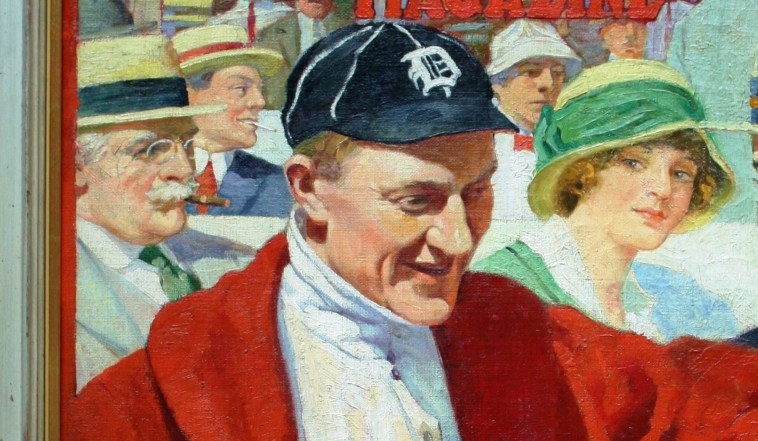Tyrus Cobb was the most dominant player ever to step on a baseball diamond. He was also reputed to be one of the meanest. The stories of his temper, cold-hearted behavior on and off the field, and a take-no-prisoners style of play still stand as the best baseball lore 85 years after he retired from America’s pastime. Feared for sliding hard and high into a base to take out the unlucky soul protecting the bag, Cobb would sharpen his metal cleats in the dugout during games and yell out to the opposing second baseman that his daggered feet were coming his way. “Baseball is a red-blooded sport for red-blooded men,” he snarled. “It’s no pink tea, and mollycoddles had better stay out. It’s a struggle for supremacy, survival of the fittest.” He slugged hecklers and was said to have evicted his own teammates from rental property he owned when they were down on their luck.
Videos By Rare
A real jerk, huh? Not so fast, sport. It ends up the Georgia Peach was peachier in private life than anyone knew. In a new memoir, “Heart of a Tiger: Growing Up with My Grandfather, Ty Cobb” (ECW Press, 279 pages, $24.95), Herschel Cobb pulls the curtain back to show a kind and attentive grandpa who stepped in when his parents failed and got the kid safely into adulthood.
Without his “granddaddy,” Herschel said he wouldn’t have survived his “chaotic, destructive household” in which his mother was constantly drunk and sleeping around and his vicious father was physically abusive. “I could not think of one single time with my father that was not filled with dread and terror,” he writes. His famous grandfather would intervene to protect him and his two siblings, take them away from the house for ice cream, fishing trips and to his Lake Tahoe cabin for the summers, and comically butcher the English language in mock theatrics to make the children giggle. “Growing up, my time with my grandfather was my bedrock,” Herschel states. “Those experiences were etched in my emotional memory, providing strength and guidance.”
Cobb the ferocious ballplayer blamed the mean streets of his adopted Motor City for rubbing off on him and shaping his public brand as a badass. “When I came to Detroit, I was just a mild-mannered Sunday school boy,” he claimed. It was a match made for the ages as the partnership worked to the advantage of Cobb and the Detroit Tigers, who won the American League pennant three years in a row in his prime and helped Cobb become Major League Baseball’s first millionaire (thanks to the savvy investment of his large salary in Detroit’s General Motors and Coca-Cola from his home state of Georgia).
Although it’s rare to find accounts of the matter in the countless negative writings about Cobb, his grandson Herschel says the ruthless baserunner known as the “genius in spikes” was very generous with his riches. Ty gave envelopes stuffed with $100 bills to impoverished, depressed former baseball players whose glory days were long gone. And he donated a substantial sum of his fortune to hospitals, various charities to aid the downtrodden, and to found college-scholarships which still send students to school today. “I regret . . . that I never went to college,” the sports icon lamented. “I feel I should have been a doctor.” He made sure others got the chance.
Ty Cobb was the first person elected into the Baseball Hall of Fame in 1936. Some of the records he stacked up still stand, such as his amazing lifetime batting average of .367. In 24 seasons, he won 12 batting titles, including nine in a row in 1907-15, and hit over .400 three times; he only hit below .320 once. “A ball bat is a wondrous weapon,” he mused about his athletic accomplishments. Now add thoughtful mentor and sweet grandpa to the history books. For baseball buffs and those with a soft spot for a tender human-interest story, “Heart of a Tiger” is page-turning reading for those summer nights when the home game is rained out.
Brett M. Decker is Editor-in-Chief of Rare and a die-hard Detroit Tigers fanatic. Follow him on Twitter @BrettMDecker

